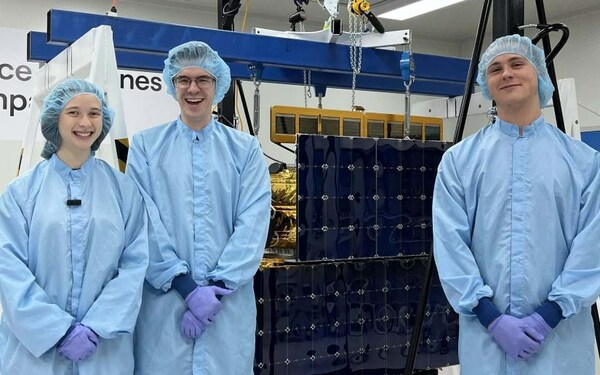When the stars align: University of Technology Sydney (UTS) partners with high-tech start-up to drive sustainability in Australian space industry
- Written by PR Newswire
SYDNEY, March 13, 2024 /PRNewswire/ -- The commercialisation of the Australian space sector is light years away from where it was just three years ago.
 UTS engineering students Liv, John and Jacob interned with Space Machines Company to help build the satellite Optimus. Photo by Jessica Lo.
UTS engineering students Liv, John and Jacob interned with Space Machines Company to help build the satellite Optimus. Photo by Jessica Lo.
UTS Tech Lab Director of Business Development Roger Kermode met with Australian high-tech start-up Space Machines Company (SMC) CEO Rajat Kulshrestha, who shared a vision to build a business capable of inspecting, repairing, relocating, servicing, upgrading and disposing of spacecraft to create a more sustainable space industry. This coincided with the announcement by the previous Federal Government that it aimed to triple the national space economy from AU$4 billion to AU$12 billion and create 20,000 jobs by 2030.
While SMC's pathway was clear, it became obvious that its dual goals of technological advancement and commercial viability would require a supporting partner with access to academic and technical expertise as well as cutting-edge facilities, equipment and workshop facilities. UTS Tech Lab was able to develop an innovation ecosystem that saw SMC provided with access to state-of-the-art equipment that would otherwise have to be rented or purchased.
The collaboration unfolded in sync with UTS's strategic initiative to amplify investment in industry partnerships, particularly by establishing innovation precincts tailored to fulfill the requirements of NSW's broader innovation strategy. The strategic initiative seeks to cultivate best-practice research models, fostering a dynamic culture of collaboration and innovation within the university and its partner networks.
In addition to creating new jobs and new research opportunities for researchers, forging closer relationships with industry partners also provides a host of internship and graduate opportunities for students. Currently, more than 20 per cent of SMC employees come from UTS - and SMC is now on the cusp of maintaining a permanent presence in space.
The Optimus satellite launched into space on 5 March, and heralds the beginning of a new era in space sustainability as the first Australian commercial satellite capable of providing existing space infrastructure and satellites with life-extension services, inspections and on-orbit assistance.
The University of Technology Sydney (UTS) is one of the top 100 universities in the world and a leading public university of technology with global impact. Visit discover.uts.edu.au to learn more.
Read more https://www.prnasia.com/story/archive/4359995_AE59995_0







